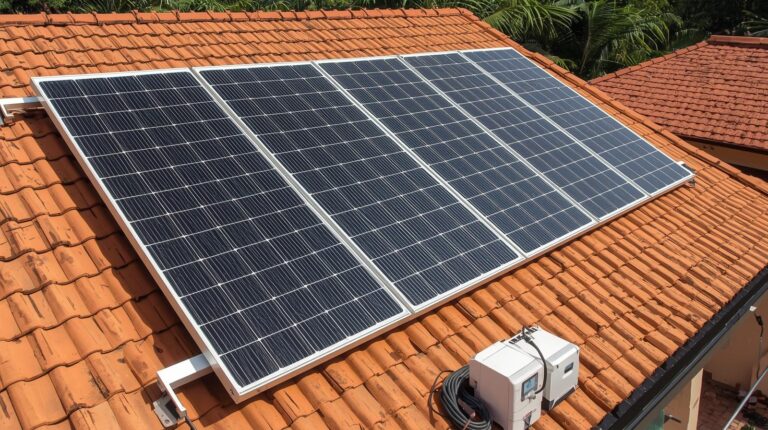Imagine a world where carbon emissions are reduced, and the air you breathe is cleaner and fresher. Photovoltaic cells can make this a reality. These remarkable devices harness the power of the sun to generate electricity, providing a sustainable solution to our energy needs.
By utilizing solar power, we can significantly decrease greenhouse gas emissions, combat climate change, and create a greener future for all. Discover the 13 incredible ways photovoltaic cells are reducing carbon emissions and transforming our world.
Key Takeaways
- Photovoltaic cells harness sunlight to generate electricity without emitting greenhouse gases.
- Transitioning to solar energy can decrease carbon dioxide emissions by an average of 35,180 pounds per year.
- Solar panels reduce dependence on traditional energy sources that contribute to carbon emissions.
- Utilizing photovoltaic cells helps mitigate the environmental impact of traditional energy sources.
Photovoltaic Cells and Carbon Emissions
Photovoltaic cells can significantly reduce your carbon emissions. By harnessing sunlight, these clean energy solutions convert solar energy into electricity without emitting greenhouse gases. Photovoltaic cells, commonly known as solar panels, use the photovoltaic effect to generate electricity. When sunlight hits the cells, it excites electrons, creating a flow of electricity.
This process is clean and sustainable, as it doesn’t rely on fossil fuels or produce harmful byproducts. By adopting photovoltaic cells, you can reduce your dependence on traditional energy sources, which often contribute to carbon emissions and climate change. In fact, studies show that transitioning to solar energy can decrease carbon dioxide emissions by an average of 35,180 pounds per year.
Join the growing community of solar energy users and make a positive impact on the environment.
Harnessing Solar Energy for Sustainability
By harnessing solar energy with photovoltaic cells, you can actively contribute to sustainability and reduce carbon emissions. Solar energy revolutionizes the way we generate power by harnessing the abundant energy from the sun. This sustainable power generation method offers numerous benefits, including a significant reduction in greenhouse gas emissions.
Photovoltaic cells convert sunlight directly into electricity, making them an efficient and environmentally friendly option. When you choose to install solar panels, you become part of a global effort to combat climate change and create a cleaner future.
By generating your electricity from the sun, you reduce your reliance on fossil fuels and help decrease carbon emissions, which are a major contributor to global warming.
Embracing the solar energy revolution is a crucial step towards a more sustainable and environmentally conscious world.
Renewable Energy Solution: Photovoltaic Cells
Photovoltaic cells, also known as solar panels, offer a renewable energy solution that can significantly reduce carbon emissions. By harnessing the power of the sun, these cells convert sunlight into electricity without emitting greenhouse gases.
The use of photovoltaic cells not only helps to mitigate the environmental impact of traditional energy sources but also provides a sustainable and clean energy solution for a wide range of applications.
Solar Power Benefits
You can easily understand the benefits of solar power by considering how it reduces carbon emissions. Solar power, harnessed through photovoltaic cells, offers numerous advantages and benefits.
First and foremost, solar power is a renewable energy solution that utilizes the abundant sunlight available on our planet. Unlike fossil fuels, solar energy doesn’t deplete natural resources or contribute to greenhouse gas emissions.
By generating electricity from sunlight, photovoltaic cells significantly reduce carbon emissions, helping to mitigate climate change. Moreover, solar power installations can be deployed at various scales, from residential rooftops to large-scale solar farms, providing decentralized energy solutions and reducing dependence on centralized power grids.
Additionally, solar power systems require minimal maintenance, resulting in lower operational costs and increased energy savings for individuals and businesses alike. Embracing solar power as a sustainable energy source not only reduces carbon emissions but also fosters a sense of belonging to a global community committed to environmental stewardship.
Environmental Impact Reduction
One key way to reduce carbon emissions is through the use of photovoltaic cells. These cells offer an effective renewable energy solution for minimizing environmental impact. Photovoltaic cells, also known as solar cells, convert sunlight directly into electricity without producing any harmful emissions.
By harnessing the power of the sun, photovoltaic cells provide clean energy solutions that significantly reduce greenhouse gas emissions and contribute to environmental conservation efforts. In fact, studies have shown that the use of photovoltaic cells can reduce carbon dioxide emissions by up to 90% compared to traditional fossil fuel-based electricity generation.
This reduction in carbon emissions not only helps combat climate change but also improves air quality and reduces the negative health effects associated with air pollution. By embracing photovoltaic cells as a clean energy solution, we can make a positive impact on our planet and create a sustainable future for generations to come.
Reducing Greenhouse Gas Emissions With PV Cells
Reducing greenhouse gas emissions is a critical goal in combating climate change. Photovoltaic (PV) cells offer a promising solution in this regard. These cells harness the power of the sun to generate electricity, thereby reducing the need for fossil fuel-based energy sources. By transitioning to solar energy, we can significantly reduce carbon emissions and mitigate the damaging effects of greenhouse gases on the environment.
PV Cells Combat Pollution
Photovoltaic cells play a crucial role in curbing pollution by significantly reducing greenhouse gas emissions. By harnessing solar energy, these cells convert sunlight into electricity, offering a sustainable alternative to traditional energy sources that contribute to air pollution.
With the use of PV cells, we can combat the harmful effects of greenhouse gases and work towards a cleaner, healthier environment. According to research, every kilowatt-hour of solar energy generated by PV cells reduces carbon dioxide emissions by approximately 1.5 pounds. This means that as more individuals and businesses adopt solar energy systems, we can collectively reduce the amount of greenhouse gases released into the atmosphere.
PV cells offer a practical and effective solution to address air pollution and promote environmental sustainability. Join the movement and contribute to a greener future.
Benefits of Solar Energy
By utilizing solar energy with PV cells, you can significantly reduce greenhouse gas emissions and contribute to a cleaner environment. Here are the benefits of clean energy and the advantages of solar energy:
- Lower carbon footprint: Solar energy produces electricity without burning fossil fuels, which means it emits zero greenhouse gases during operation. This helps to combat climate change and reduce air pollution.
- Renewable and sustainable: Solar energy is derived from sunlight, a renewable resource that will never run out. By harnessing this abundant source of energy, we can reduce our dependence on finite fossil fuels and create a more sustainable future.
- Energy independence: Installing solar panels on your property allows you to generate your own electricity, reducing your reliance on the traditional power grid. This not only saves you money but also reduces the overall demand for fossil fuel-generated electricity.
- Long-term cost savings: While the initial investment in solar panels may seem high, the long-term cost savings are significant. Solar energy can help you save money on your electricity bills and even earn credits through net metering programs.
The Environmental Benefits of Solar Power
Switching to solar power can significantly decrease your carbon footprint and help protect the environment. Solar energy offers numerous advantages in terms of environmental sustainability.
Firstly, solar power generates electricity without emitting greenhouse gases or other harmful pollutants, unlike traditional fossil fuel-based energy sources. This reduces air pollution and helps combat climate change, as solar energy is a clean and renewable source of power.
Secondly, solar panels require minimal water for maintenance, unlike conventional power plants that consume large amounts of water for cooling. This helps conserve precious water resources, especially in arid regions where water scarcity is a pressing issue.
Lastly, solar panels can be installed on rooftops or in unused spaces, reducing the need for land-intensive energy infrastructure and preserving natural habitats.
Minimizing Carbon Footprint With Photovoltaic Cells
Reduce your carbon footprint by utilizing photovoltaic cells. These innovative devices not only generate clean and renewable energy, but they also have the potential to minimize energy consumption and increase solar panel efficiency.
Here’s how photovoltaic cells can help you reduce your carbon footprint:
- Minimizing energy consumption: Photovoltaic cells convert sunlight directly into electricity, reducing the need for fossil fuel-based energy sources. By using solar power, you can significantly decrease your reliance on non-renewable resources and lower your carbon emissions.
- Increasing solar panel efficiency: Advances in photovoltaic technology have led to higher efficiency rates, meaning more energy can be generated from the same amount of sunlight. This increased efficiency allows you to maximize the electricity produced, further reducing your carbon footprint.
- Lowering greenhouse gas emissions: By replacing traditional energy sources with solar power, you contribute to a reduction in greenhouse gas emissions. Solar energy production releases significantly fewer pollutants into the atmosphere, helping to combat climate change and improve air quality.
- Promoting sustainability: Utilizing photovoltaic cells promotes sustainable practices by harnessing a clean and abundant energy source. By adopting solar power, you can actively contribute to the global efforts to create a more sustainable and environmentally friendly future.
Photovoltaic Cells: a Clean Energy Alternative
To further reduce your carbon footprint, consider incorporating photovoltaic cells as a clean energy alternative. Photovoltaic cells, also known as solar cells, harness the power of sunlight to generate electricity.
They offer numerous benefits, including reducing greenhouse gas emissions and dependence on fossil fuels. By installing solar panels on your property, you can generate clean energy and contribute to a sustainable future.
Here’s a breakdown of the advantages of photovoltaic cells:
| Advantages | |
|---|---|
| Clean energy | Solar cells produce electricity without emitting harmful pollutants, making them an environmentally friendly choice. |
| Renewable resource | Sunlight is an abundant and renewable resource, ensuring a continuous source of clean energy. |
| Cost savings | Over time, installing photovoltaic cells can significantly reduce your electricity bills, leading to long-term cost savings. |
| Energy independence | By generating your own electricity, you become less reliant on the grid and have more control over your energy consumption. |
| Long lifespan | Solar panels typically have a lifespan of 25-30 years, providing a reliable and durable energy solution. |
Incorporating photovoltaic cells into your energy mix is a practical way to embrace clean energy and reduce your carbon emissions.
The Role of Solar Panels in Reducing Carbon Emissions
Solar panels play a crucial role in reducing carbon emissions and promoting sustainable development through clean energy production. Here are four ways solar panels contribute to the reduction of carbon emissions:
- Renewable Energy Generation: Solar panels harness the power of the sun to produce electricity, reducing the need for fossil fuel-based energy sources that emit carbon dioxide (CO2) and other greenhouse gases.
- Carbon-Free Operation: Solar panels operate without emitting any carbon or harmful pollutants, making them a clean and environmentally friendly energy solution.
- Offsetting Fossil Fuel Usage: By generating clean energy, solar panels help offset the use of fossil fuels in traditional energy production, thereby reducing carbon emissions from power plants.
- Long-Term Carbon Reduction: Solar panels have a long lifespan and can continue to produce carbon-free energy for decades, contributing to sustained carbon reduction over time.
With their significant role in energy production and sustainable development, solar panels are a key solution in reducing carbon emissions and mitigating climate change.
Sustainable Energy Generation: Photovoltaic Cells
When it comes to sustainable energy generation, photovoltaic cells offer numerous benefits. By harnessing the power of sunlight and converting it into electricity, solar power provides a renewable energy source that’s both clean and abundant.
In addition to reducing reliance on fossil fuels, the use of photovoltaic cells also helps to significantly reduce carbon emissions, thereby contributing to the global efforts to combat climate change and reduce our carbon footprint.
Solar Power Benefits
By using photovoltaic cells, you can significantly reduce carbon emissions and contribute to a more sustainable energy generation. Here are the key benefits of solar power:
Solar Power Efficiency:
- Photovoltaic cells are becoming increasingly efficient in converting sunlight into electricity.
- With advancements in technology, solar panels can now generate more power from the same amount of sunlight, maximizing energy production.
Solar Power Affordability:
- The cost of solar panels has significantly decreased over the years, making solar power a more affordable option for homeowners and businesses.
- Government incentives and financing options further reduce the upfront costs, making it an attractive investment.
Energy Independence:
- By harnessing the power of the sun, you can reduce your dependency on traditional energy sources.
- Solar power allows for decentralized energy generation, giving you control over your energy production and reducing reliance on fossil fuels.
Environmental Benefits:
- Solar power is a clean and renewable energy source that produces no greenhouse gas emissions.
- By choosing solar power, you’re actively contributing to the reduction of air pollution and mitigating climate change.
Switching to solar power not only offers environmental benefits but also provides long-term financial savings and energy independence. Join the growing community of solar-powered homes and businesses and be part of the solution for a sustainable future.
Renewable Energy Source
With the use of photovoltaic cells, you can continue to reduce carbon emissions and contribute to sustainable energy generation by relying on a renewable energy source. Renewable energy development is crucial in the fight against climate change, and photovoltaic cells play a significant role in this endeavor.
These cells convert sunlight into electricity, providing a clean and abundant source of power. Solar panel efficiency has steadily increased over the years, thanks to advancements in technology and manufacturing processes. Higher efficiency means that more sunlight is converted into electricity, resulting in greater energy production and reduced reliance on fossil fuels.
Carbon Footprint Reduction
To significantly reduce your carbon footprint, rely on photovoltaic cells for sustainable energy generation.
Photovoltaic cells offer numerous benefits that contribute to carbon footprint reduction:
- Clean energy production: Photovoltaic cells convert sunlight into electricity without emitting greenhouse gases, reducing reliance on fossil fuels.
- Carbon offset programs: By generating clean energy, photovoltaic cells can help individuals and organizations participate in carbon offset programs. These programs aim to neutralize or mitigate carbon emissions by investing in projects that reduce greenhouse gas emissions.
- Reduced reliance on the grid: Photovoltaic cells enable individuals to generate their own electricity, reducing the demand for energy from traditional power plants, which often rely on fossil fuels.
- Promotion of sustainable transportation: As photovoltaic cells help reduce carbon emissions in the electricity sector, they contribute to the overall transition towards sustainable transportation, such as electric vehicles charged by solar energy.
Solar Power’s Impact on Carbon Dioxide Reduction
Solar power significantly reduces carbon dioxide emissions. As one of the most effective carbon emissions reduction strategies, solar power’s environmental impact is profound.
Photovoltaic (PV) cells, which convert sunlight into electricity, play a crucial role in this process. By harnessing the sun’s energy, PV cells generate clean electricity without producing any carbon dioxide emissions. This directly combats climate change and helps to mitigate the harmful effects of greenhouse gases.
In fact, studies have shown that solar power can reduce carbon dioxide emissions by up to 90% compared to traditional fossil fuel-based energy sources. By adopting solar power as a viable and sustainable energy solution, we can make significant progress in reducing our carbon footprint and creating a cleaner, healthier environment for future generations.
How PV Cells Contribute to a Greener Future
By harnessing the sun’s energy, PV cells can help you contribute to a greener future. Here’s how:
- Reduced carbon emissions: PV cells convert sunlight into electricity without producing harmful greenhouse gases, effectively reducing carbon emissions and mitigating climate change.
- Renewable energy: PV cells harness solar energy, which is a sustainable and abundant resource. By utilizing solar power, we can reduce our reliance on fossil fuels and ensure a cleaner planet for future generations.
- Energy independence: PV cells allow individuals and communities to generate their own electricity, reducing dependency on traditional energy sources and increasing self-sufficiency.
- Job creation: The growing demand for PV cells and solar energy systems has created a significant number of jobs in the renewable energy sector. Embracing PV cells for sustainable development not only benefits the environment but also contributes to economic growth and employment opportunities.
Incorporating PV cells into our daily lives is a crucial step towards achieving a greener future and ensuring a sustainable and cleaner planet for all.
Photovoltaic Cells and the Fight Against Climate Change
Harness the power of photovoltaic cells to actively combat climate change by significantly reducing carbon emissions. Photovoltaic cells play a crucial role in the fight against climate change, offering a sustainable and clean energy solution. By converting sunlight into electricity, these cells eliminate the need for fossil fuel-based power generation, which is a major contributor to greenhouse gas emissions.
Here is a table showcasing the impact of photovoltaic cells on sustainable development and energy independence:
| Photovoltaic Cells and Sustainable Development | Photovoltaic Cells and Energy Independence |
|---|---|
| Reduce carbon emissions and air pollution | Decrease reliance on fossil fuels |
| Promote renewable energy sources | Increase energy security |
| Create jobs and stimulate economic growth | Reduce vulnerability to fluctuating fuel prices |
The Transformative Power of Solar Energy
You can greatly reduce carbon emissions by embracing the transformative power of solar energy. Here are four reasons why solar energy adoption has the potential to make a significant impact:
- Renewable and Clean: Solar energy is a renewable resource, meaning it can be replenished naturally. Unlike fossil fuels, solar energy produces no harmful emissions, reducing carbon dioxide and other pollutants in the atmosphere.
- Energy Independence: By utilizing solar energy, you can become less reliant on traditional energy sources. This independence not only reduces your carbon footprint but also protects you from rising energy costs and potential disruptions in the supply chain.
- Job Creation: The solar industry has experienced tremendous growth in recent years, creating numerous job opportunities. By embracing solar energy, you contribute to the growth of this industry and support the creation of more clean energy jobs.
- Community Resilience: Solar energy can enhance community resilience by providing a reliable source of power during emergencies and natural disasters. With a solar power system, you can continue to generate electricity even when the grid is down, ensuring your safety and well-being.
Embracing the transformative potential of solar energy is a practical and impactful way to reduce carbon emissions while enjoying the benefits of clean, renewable power.
Conclusion
You’ve now seen the remarkable impact that photovoltaic cells have in reducing carbon emissions. By harnessing solar energy, these cells offer a sustainable solution to our energy needs.
With their ability to reduce greenhouse gas emissions and contribute to a greener future, they play a crucial role in the fight against climate change.
Embracing solar power isn’t only transformative but also necessary for a more sustainable and environmentally-friendly future. So, let’s seize this opportunity and power our world with the sun.




